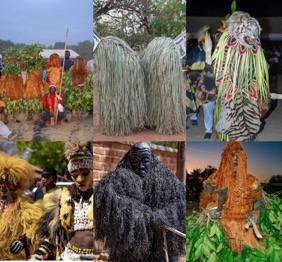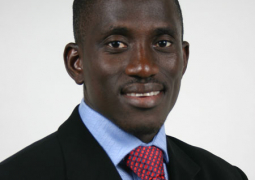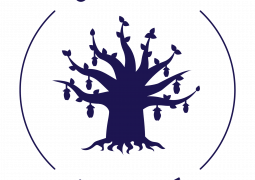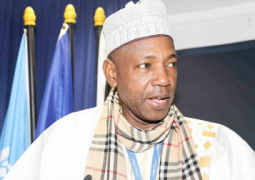
The streets were transformed into a spectacle of colour, culture, and tradition, drawing locals and visitors alike to witness the dazzling parades that showcased the rich heritage of the region.
The Janjanbureh Kankurang Festival was first revived in 2018 by the International Trade Centre under the European Union-funded Youth Empowerment Project, in partnership with the community of Janjanbureh, the National Centre for Arts and Culture, and the Gambia Tourism Board.
During the opening ceremony, Muhammed Saidykhan, president of the Janjanbureh Kankurang Festival, stated that in a world often divided, traditions like the Kankurang serve as a unifying force. “They bring people of all ages, backgrounds, and beliefs together to celebrate what we share,” he said. “This festival reminds us that despite our differences, we are one people, bound by our respect for each other and our love for this land we call home.”
He added that the music, dance, and rituals witnessed during the festival were not just entertainment but a celebration of the unique identities that make up their community. “Together, we weave a tapestry of harmony, resilience, and pride,” Saidykhan said.
Yusupha Keita, country representative of the International Trade Centre (ITC), pointed out that the festival symbolises hope, resilience and the extraordinary power of collaboration.
At the ITC, Keita said their mission is clear: to empower micro, small, and medium-sized enterprises, individuals, and communities. “We strive to foster sustainable and inclusive development, ensuring that no one is left behind.”
He added that they firmly believe partnership and inclusion are the keys to unlocking a brighter future for all.
Keita further notes that festivals play a vital role in preserving heritage, strengthening unity and contributing to the economy. “Our shared vision is for this festival to become a household name across The Gambia and beyond, attracting domestic, regional, and international visitors while boosting our tourism competitiveness,” he said.
Bakary Y. Badjie, Minister for Youth and Sports, emphasised that culture plays a key role in the development of a country because it reminds people of their past and their roots. He added that it helps mould young people to better understand their cultural background and heritage.
“As a government,” the Youth and Sports Minister said, “we recognize the activities happening around us. It is a priority of the government to ensure that we continue to do our best to promote our culture, heritage, and tradition.”
Siaka Fadera, Deputy Director General of the National Centre for Arts and Culture (NCAC), extended appreciation to the supporting partners for the successful hosting of the Kankurang Festival. He said preserving their intangible cultural heritage is a key focus for the NCAC, adding that the government places great importance on preserving the national culture, history, and traditions.
The NCAC Deputy Director General tasked the Janjanbureh Festival Committee to ensure the festival continues to grow. “It should improve every year,” he urges.
Imma Roca I Cortés, European Union Ambassador to The Gambia, also reiterated the EU’s commitment to promoting cultural diversity, heritage, and community empowerment.
Speakers at the event included the National Assembly Member for Janjanbureh, Omar Jato Jammeh, the Chief of Janjanbureh, Old Pa Jawo, and the Governor of the Central River Region, Ousman Bah, who all emphasised the significance of the Kankurang. They noted that the masquerades, deeply rooted in their tradition, symbolise protection, strength, and unity.
“This festival is not merely a showcase of our customs and traditions but a vital means of passing down our stories and values to the next generation,” the CRR Governor substantiates the value of the festival.




